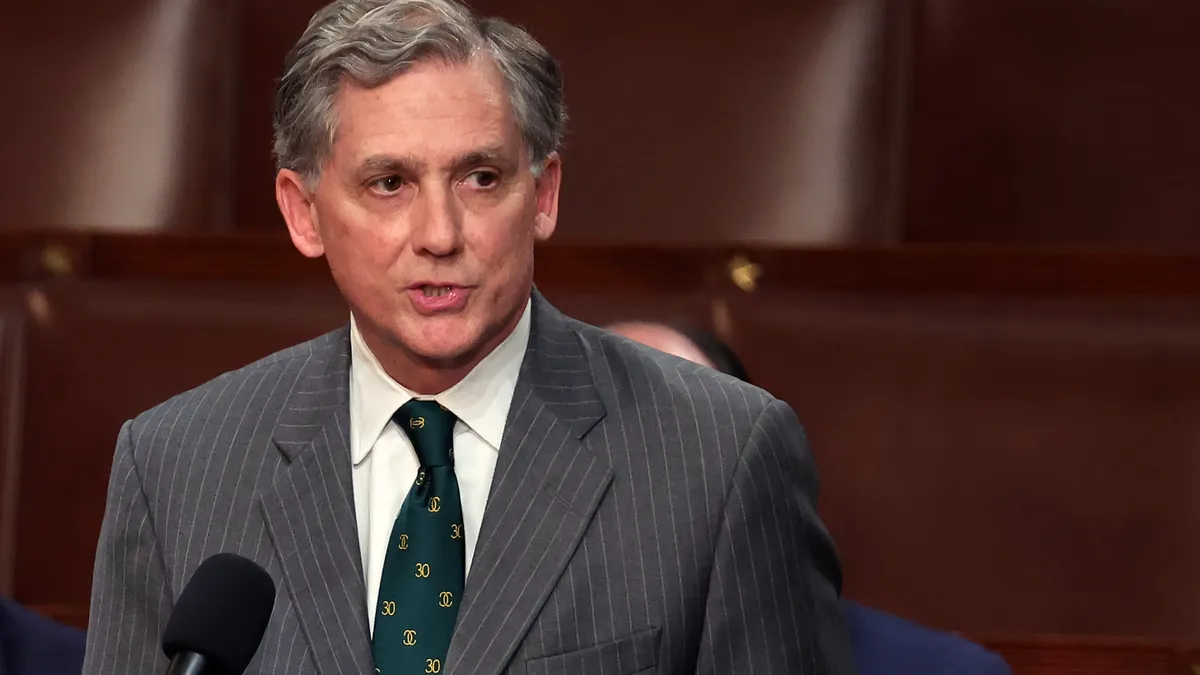A House Financial Services subcommittee has drafted legislative proposals related to earned wage access and the buy now, pay later market.
The legislative proposals emerged at a Wednesday hearing of the Subcommittee on Digital Assets, Financial Technology and Inclusion, titled “Modernizing Financial Services Through Innovation and Competition.” During the hearing, lawmakers queried corporate, trade group and consumer advocate witnesses about the evolving payments and fintech issues, and the regulatory environment for those payments strategies.
The proposed earned wage access bill, called the Earned Wage Access Consumer Protection Act, would “regulate the business of offering and providing earned wage access services to consumers, and for other purposes,” according to a draft presented with hearing agenda material.
The bill would establish operational requirements for on-demand pay providers, including “disclosure requirements, dispute resolution policies, and limitations related to fees and other payments,” according to a committee memorandum. The bill is set to be introduced by Rep. Bryan Steil, R-Wisconsin. Steil’s office didn’t immediately return a request for comment.
The proposed BNPL bill, called the Examining Consumer Choice in Digital Payments Act, would require the Consumer Financial Protection Bureau and the U.S. Government Accountability Office to conduct a study on BNPL services “to help determine the degree to which consumers are utilizing BNPL for retail purchases,” according to the memorandum. A bill author was not named in the legislative discussion draft.
The study would focus on disclosures offered by BNPL providers, market trends and “other factors that will provide the CFPB and the public with information to help better understand the BNPL market,” the memorandum said. The study would be required before the CFPB could issue any new rules related to buy now, pay later services, the discussion draft said. A CFPB spokesperson declined to comment Wednesday on the proposal.
The CFPB has issued two reports related to BNPL, one last September and one in March. The bureau has expressed concern with consumer loan stacking and providers engaging in data harvesting. Last year, the CFPB said it’s considering rules or “interpretative guidance” to ensure BNPL providers adhere to laws that apply to credit card companies.
As on-demand pay has gained popularity, the EWA industry has drawn regulatory scrutiny too. The CFPB has said it would weigh in on that issue, but has yet to act. In the meantime, state lawmakers and regulators have taken or are considering action on the issue, including in Nevada, Missouri, Connecticut and California.
At the hearing, two other pieces of fintech-related legislation were also highlighted, including one on fintech innovation, with respect to petitioning regulatory agencies about existing rules, and the other requiring regulators to provide Congress with an overview of their “internal supervisory technologies.”
At the outset of Wednesday’s nearly two-hour hearing, Rep. French Hill, R-Arkansas, said the subcommittee convened Wednesday to explore fintech issues and better understand products and services in the area. He conveyed the need for lawmakers to consider policy questions to “get that balance between innovation and customer protection just right.”
“The benefits of fintech firms and the products and services they provide far exceed the risks that they might well pose,” said Hill, the subcommittee’s chairman.
Rep. Stephen Lynch, D-Massachusetts, expressed more skepticism, saying some fintech and BNPL offerings are simply traditional finance products repackaged “in a way to evade laws and regulations under the claims of innovation.”
Testifying during the hearing, Jodie Kelley, CEO of the Electronic Transactions Association trade group, contended that the payments and fintech industries are already subject to a thorough regulatory framework, supplemented by “robust” self-regulatory efforts.
Kelley encouraged lawmakers to draft policies that are “technology-neutral, principles-based, and allow for industry-led standards.”
Mitria Spotser, vice president and director of federal policy at the Center for Responsible Lending, called for more regulations with regard to EWA and BNPL.
“If it looks like a duck, swims like a duck, and it quacks like a duck, it's probably a duck,” she said. “Buy now, pay later, early wage access – they look, act and function like credit. They look and function and act like capital and loans. They should be regulated as such.”
The Center for Responsible Lending has no aversion to BNPL and EWA products, as long as providers are required to produce the same cost information and compete under the same requirements that all U.S. financial institutions compete under, Spotser said.
Spotser added that she hopes the CFPB provides guidance on disclosure obligations.
Spokespeople for Hill and Lynch didn’t immediately return requests for comment on the legislative proposals.


















